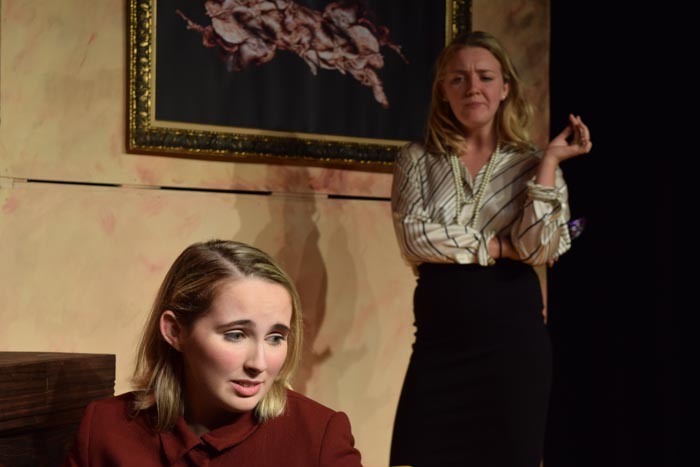Tuesday Night Cafe Theatre (TNC) is a McGill theatre company run entirely by students. Its first production of this season, Owners, is a tragic exploration of love, temptation, and ambition in the age of late capitalism. Written by Caryl Churchill in 1972, Owners is a a two-act play about obsession with power. In his directorial debut, Olivier Bishop-Mercier (U3, Theatre Studies and Math) brings the production to stage at Morrice Hall. Ambitious albeit amateurish, TNC’s production of Owners is not a stellar rendition—but not a total miss either.
As a part of ARTiFACT, TNC’s monthly interdisciplinary and inclusive performing space, Owners takes up this month’s theme of dis/possession. The plot sets up two main levels of exploring this theme. First is the gendered and financial conflict between Clegg (Andrew Young, U3 History), a misogynistic butcher, and his wife, Marion (Sara Harvey, U2 Theatre Studies), a well-off real estate agent, whom he is planning to kill. Simultaneously, we have Marion’s plot to force out poor tenants, Alec (Guillaume Doussin, U4 Management) and Lisa (Emily Sheeran, U1 Arts), to make way for a more profitable housing upgrade.
Compared to his cohort, Alec is uniquely unmotivated by desire. It is for this very reason that he is the most likeable of the characters. Alec’s arch balances borderline slapstick comedy—he dozes off after a major burglary, with more sinister plot points, such as revealing how he became disillusioned with his life, doing his character’s nihilistic disposition justice. The actors also pull off culturally-specific variations of an English accent; Young’s rough drawl adds credibility to his persona of the rowdy, controlling butcher. With a dominant stage presence, Harvey’s portrayal of Marion, the go-getter agent, is fiercely magnetic.
Set designers Riki Shimoda and Alizee Millot built compact interior spaces that created an insulating, claustrophobic effect. The muted red and yellow palette of the lighting (Shimoda) complements the grittiness of the set design. Additionally, the use of props is minimal, and their significance is not always clear. Alec’s mother (Asha Bittender, U2 Arts) wears a textured white mask throughout the play, but the production does not overtly elaborate on its meaning, nor venture into mask work with other characters.
Morrice Halls’s ample stage space feels underutilized at times, especially in scenes that involve multiple characters on stage at once. Their positioning is poorly choreographed, and actors sometimes walk behind each other, blocking their facial expressions and obstructing their speech. One scene, which takes place in a seedy strip club, stands out as an exception; Bishop-Mercier’s direction complements Marion and Worsely’s plotting at the downstage while Clegg enjoys a lap dance in the background, creating a meaningful scene that highlights the disjointed communication between the married but loveless couple.
TNC’s newsletter for Owners gives a content warning for “themes of mental illness and suicide.” Marion’s depressive employee (Sam Miller, exchange student Arts), makes one suicide attempt after another in an unsettlingly comedic fashion. Another major element of the play that viewers should be aware of before stepping in, however, are the patterns of gendered abuse.
At two hours long, the production sometimes feels slow paced; the shortening or removal of some scenes might have allowed for more compact storytelling. The climax of the story is not predictable, and its message is not hopeful; the play ends on a sinister note, but Bishop-Mercier’s rendition effectively undercuts the closing moment with a comedic irony that captures the heart of the plot. Characters in Owners do not learn any lessons by the end; in characteristic postmodern fashion, the play gives no clear answers, but raises challenging, subversive questions that its viewers can take home.
Owners runs from October 11-14 and 18-21 at Morrice Hall, Islamic Building. Tickets are $6 for students and QDF members (with card), and $10 for general admission. To reserve tickets, email [email protected].








